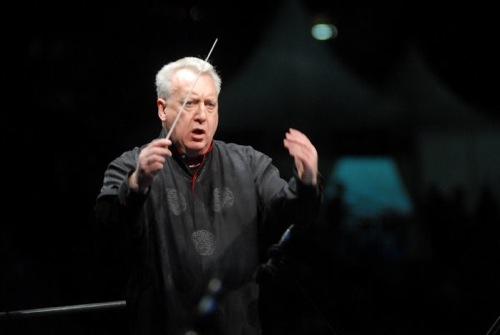It’s a neat-sounding idea for a concert: a sequence of works composed in the year the previous composer died. Neat, but not necessarily revealing. This one started with Elgar’s Cockaigne, composed – symbolically, I assume – in 1900, and ended with Vaughan Williams’s Fourth Symphony, completed in 1934, the year of Elgar’s death. In between came Britten’s Nocturne, written in VW’s last year, 1958. With a little more time, they might have added Birtwistle’s Melancolia (1976, Britten), and left everyone completely bemused.
What did it all show? That the Brits have different ways of not being up to the minute? That they hate each other’s music (this has sometimes been the case, I think)? According to the BBC announcer, Catrin Finch, the Fourth is David Atherton’s favourite VW symphony, “because it’s so forward-looking”; and the composer himself is supposed to have said, “I don’t know if I like it, but it’s what I meant,” (so they sometimes dislike their own music).
Yet surely no thoughtful person, which Atherton certainly is, truly regards this deeply self-conscious piece of rowdyism as “advanced” in any serious sense of the word, more than 20 years after The Rite of Spring and 25 after Schoenberg’s Five Pieces, to say nothing of Hindemith’s Kammermusik (1922), Prokofiev’s Second Symphony (1925) and so forth? And anyway, does “forward-looking” have to mean dissonant, chromatic, frankly horrible? Only, perhaps, when a big war turns up five years later, making the music “prophetic”. One might think we’ve grown out of these particular hang-ups, which were obviously still in Vaughan Williams’s mind as a counterblast to the (backward-looking?) pastoralism of his previous symphony. To my ears, as it happens, the Pastoral Symphony is both more innovative, more disturbing and actually far better: a genuine masterpiece, itself an echo (not a prophecy) of war. The Fourth, I’m afraid, is a period piece, and not a particularly good one.
Atherton and the BBC NOW did their best for it, of course, and their playing had all the necessary impact. The lady next to me nearly jumped out of her skin on a couple of occasions. Whether she made anything of the meandering, largely featureless, slow movement, or the ridiculous fugal coda, I have my doubts. I, at any rate, did not.
Cockaigne, overwritten though it may be, is another matter. Elgar’s complexity and harmonic density were intuitive, I’m certain: simply the way things came out. But the result was certainly very modern by English turn-of-the-century standards, if not by anybody else’s. Well, who cares about that? This is a superb piece of writing which pulls the ear in and along, constantly surprising yet justifying all kinds of detail, deeply sophisticated in its compositional technique – the art of combination and transition, not to mention the sheer quality of the material and its orchestration. It was a worthwhile test for this fine orchestra and their excellent, undemonstrative conductor, and one they passed without a tremor.
I still can’t read the Paris section of Wordsworth’s Prelude without feeling the shape of Britten’s vocal line and the thunder of his timpani
Britten, I suspect, disliked Vaughan Williams’s music, which reminded him of the Royal College, and he must have been fairly ambivalent about Elgar – too imperial, surely, too establishment. But he found a way of side-stepping them without, so to speak, taking them on. In fact, the Nocturne is hard to source even in Britten’s well-known models – Mahler, Berg, Purcell – though probably there are bits of them here and there. Oddly enough, it was the first work of his I heard – in his own recording with Peter Pears, soon after it came out. I remember being captivated by the subtlety of the tonal language, and intrigued by the vocal melody, which sounded so effortless, though when you studied it, it proved surprisingly mobile and tricky. The word-setting was some of the most riveting I had ever encountered. I still can’t read the Paris section of Wordsworth’s Prelude without feeling the shape of Britten’s vocal line and the thunder of his timpani.
Andrew Kennedy is a different kind of tenor from Pears, more lyrical, less declamatory. His Nocturne was more accurate than Pears’s, not so dramatic, perhaps, more thoughtful, the words depicted with exquisite care and sensitivity where Pears would hurl them at you or glide over them in a sort of trance. Kennedy’s Kraken was a somnolent beast, rather slow and, dying, a little sad; his animal noises, in Middleton’s “Midnight’s bell”, were done with a kind of studious relish, as if these creaks and peeps and mews were real words you might find in a dictionary. The intense, somewhat esoteric lyricism of Owen’s “Kind Ghosts” and the final Shakespeare sonnet was caught without protest. Always one was conscious of the singer’s intelligence, less often of his passionate involvement. And the same could be said of Atherton’s accompaniment, on the slow side, finely shaded, and – some minor glitches aside – played with precision by Britten’s septet of obbligatists and the BBC NOW strings.
- Listen to this concert on the BBC iPlayer until 18 May
- Find future concerts by the BBC National Orchestra of Wales













Add comment